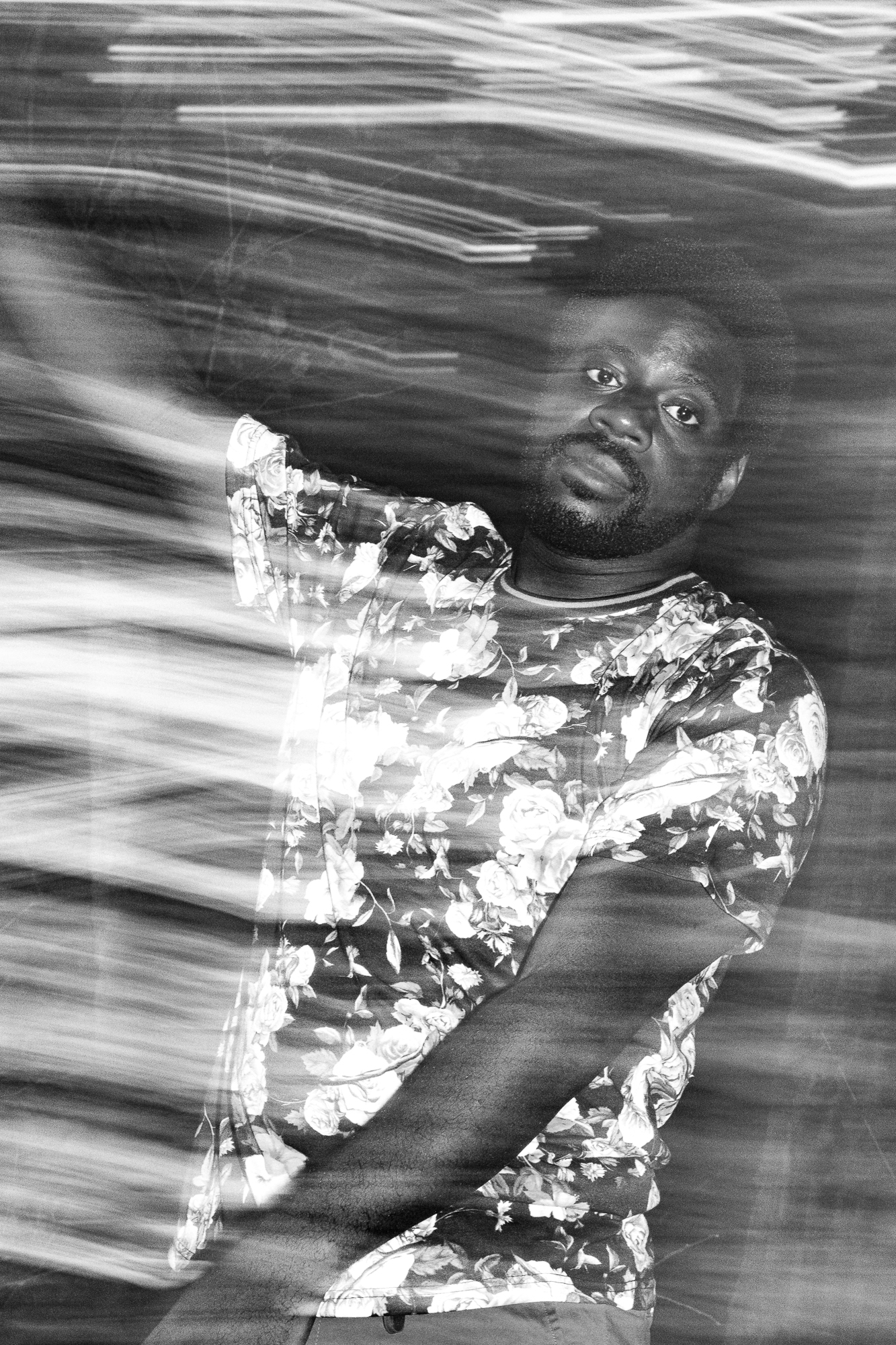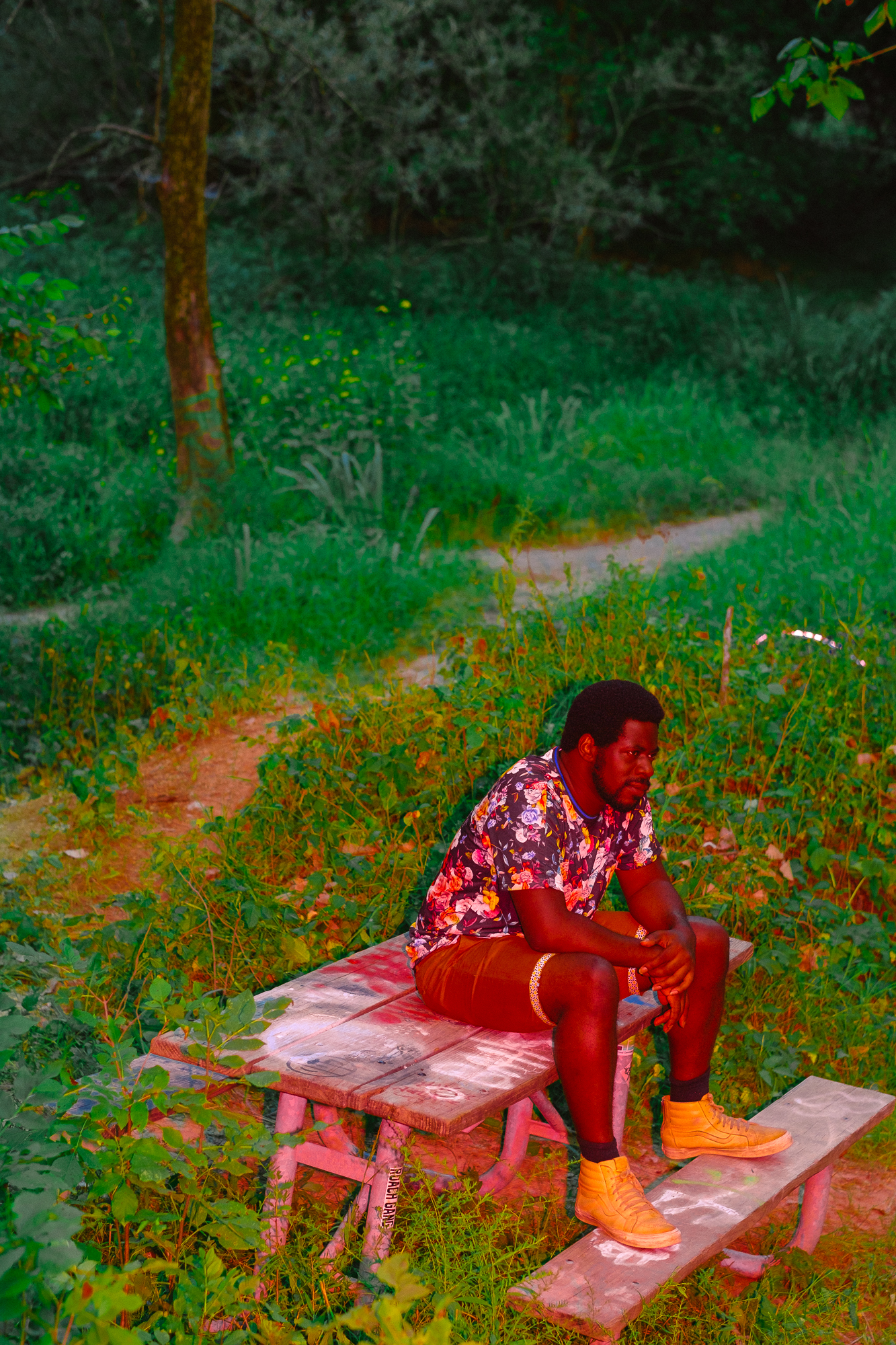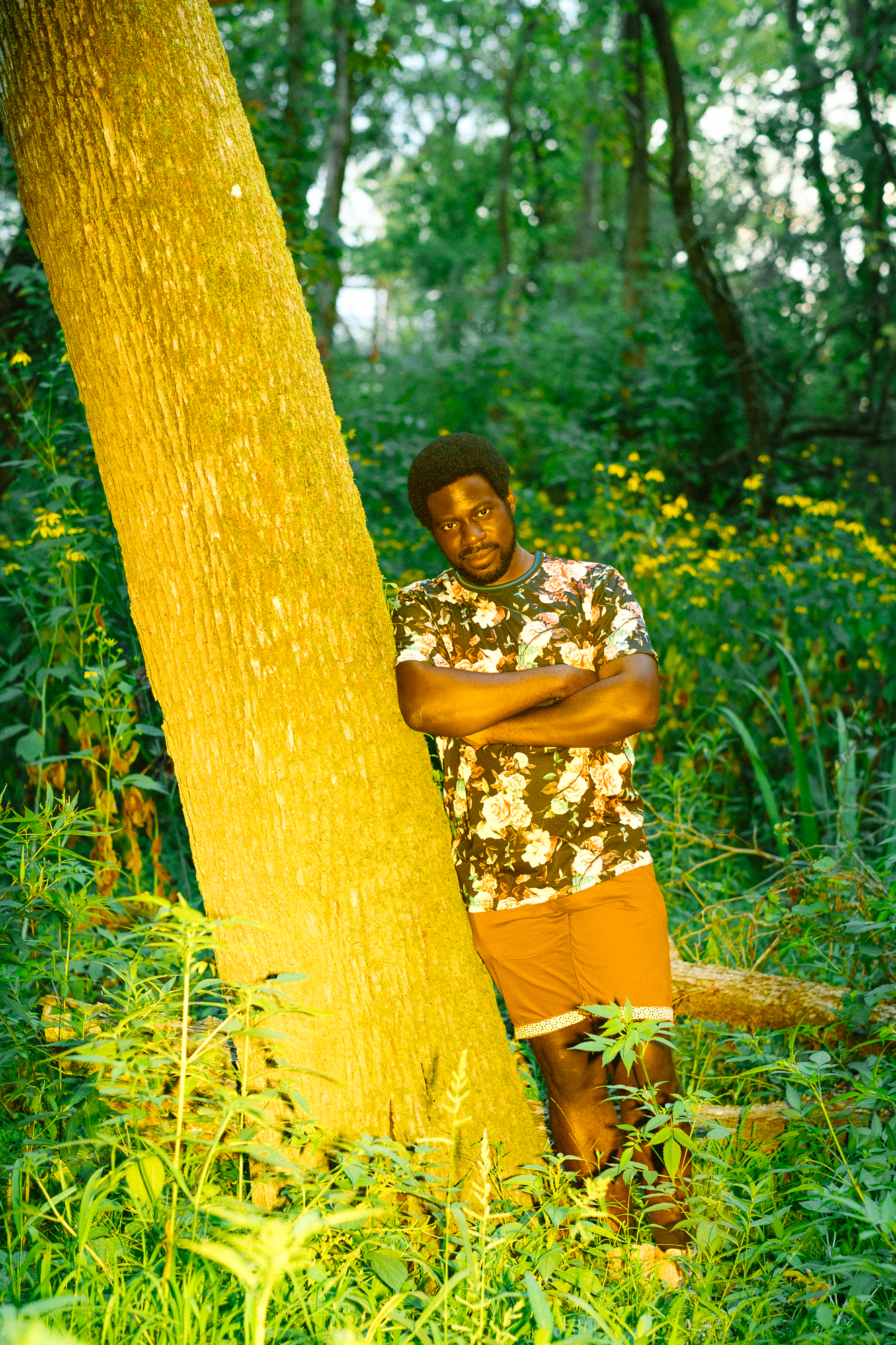On May 30, less than a week after George Floyd's death in police custody, protestors were taking to the streets nationwide. In Chicago, Nnamdi Ogbonnaya rode his bike towards downtown, along with thousands of others protesting police brutality. "I felt so shitty just sitting at home all these months because of the pandemic and having this pent-up energy," says the 30-year-old Nigerian American musician, who a few years prior had a scary run-in with police who stopped him for no reason at all while he was riding his bike. "Every direction I went was blocked off by cops and I was seeing so many disturbing things with the police," he said of the protests. “I was so angry, I didn't know how I was going to react if confronted. I needed to go do something productive."
He made it home before Mayor Lori Lightfoot instituted a last-minute curfew, raised downtown's draw bridges, and suspended public transportation, leaving demonstrators stranded and scrambling to get home. The following Friday, he released the three-song Black Plight EP, which he wrote and recorded that week. On the searing opener, “My Life,” he asks, "My life, what's it worth to you?" Anchored by pummeling guitars and drums, he sings, "Macy’s or Human Life? / Cop car or Human Life? / Rolex or Human Life? / You can fix a Target but you can't bring a person back to life." Another song, "Heartless," finds him yelling "Again and again it's the same shit again and again / Can't sit around and wait for something to change," over a bruising hardcore arrangement.
Ogbonnaya released the EP on Bandcamp Friday, a day the platform waived its revenue share on music purchases, and he donated all proceeds from the surprise EP to local organizations Assata’s Daughters and EAT Chicago, as well as direct assistance to individuals he knew were in need. He raised well over $10,000. "That shit felt so good," Ogbonnaya says, contorting his voice to a falsetto squeak as he does in his own songs whenever he's excited. "People were just like, 'damn, you gave away so much money.' That money was never mine: it was always intended to help other people." The Black Plight EP was also the best-selling release on Bandcamp for an entire week, no small feat when that specific Bandcamp Friday sold more than $4.8 million worth of music and merch.
The blistering pace of Ogbonnaya's creative process for Black Plight is how the multi-instrumentalist has operated his entire career. Over the decade-plus that he's been a fixture of Chicago's DIY music community, there's never been a lull in his output. He's played drums and bass in countless bands ranging from the math-rock of Monobody, the ambient soundscapes of Mother Evergreen, the pop-punk of Nervous Passenger, and filled in on drums for bands like Ohmme, Ratboys, and Lala Lala. He co-founded Sooper Records with local musician Glennon Curran, which has put out releases by Kaina, label co-owner Sen Morimoto, and many others.
According to his peers, Ogbonnaya is a gifted instrumentalist who can learn on the fly. "Nnamdi played drums for a Lala Lala show where the audience requested a song and he just played it correctly having never played it before," Lala Lala's Lillie West says. But more than his technical chops, which are undeniable, it's his kind, goofy, and selfless demeanor that's made him such a beloved figure in Chicago. "We played a show in Spain together and Nnamdi saw that I loved these prawn chips that you can only get in Europe," West says. "After the tour, he anonymously sent a giant bag of those chips in the mail. I knew it was him."
"Nnamdi’s a genius. Every time I think I’ve figured out the parameters of his talent, I find out there is another wing of his gifts and imagination." — Jeff Tweedy
More than his work in other bands, Ogbonnaya's solo efforts as NNAMDÏ have been some of the year's most exciting and unpredictable. Where Black Plight was a scorching blast of punk energy and righteous anger, his April LP Brat melded boisterous rap and melancholic R&B arrangements with some plucky acoustic strums and mathy riffs. These gleefully genre-bending songs are his most cohesive collection yet. The surprise LP Krazy Karl, is a largely-improvised and instrumental batch of proggy freakouts inspired by Looney Tunes composer Carl Stalling. All three releases featured Ogbonnaya performing and arranging nearly every instrument himself, and he plans to put out one more full-length before the end of the year. If his spectacular run in 2020 is any indication, the project won't sound quite like anything he's put out so far.
Few artists are so able to freely follow their whims like Ogbonnaya. His playful approach to music positions him as one of the most essential and idiosyncratic artists right now. "Nnamdi’s a genius," says Jeff Tweedy, who's bringing NNAMDÏ on tour to open for Wilco and Sleater-Kinney in 2021. "Every time I think I’ve figured out the parameters of his talent, I find out there is another wing of his gifts and imagination."

Ogbonnaya grew up in Lansing, Illinois, a suburb south of Chicago. His parents, Nigerian immigrants who are now both Christian ministers, gave him an entry point into music: His dad played guitar and loved Bob Marley and the Police while his mom sang around the house. He started playing drums in the fifth grade and got into pop-punk bands like Sum 41. By the time he started college to get his degree in electrical engineering, he was already in a long list of bands: the Para-medics, Albatross, Pisces at the Animal Fair, Nervous Passenger, My Dad, and Itto.
After his parents moved to California, Nnamdi and his brother Alfred stayed at the family home and turned it into a defacto DIY venue. Affectionately called Nnamdi's Pancake Haus, every show featured free flapjacks for concertgoers. During this time, Ogbonnaya would upload his own rap songs on Facebook as Nnamdi's Sooper Dooper Secret Side Project.
The songs were full of inside jokes meant for his friends and family, with sample titles as outrageous as "Shhhhhh(BLOPE)aaarrrrrrrtt," "Big Beautiful Dookie Booty," and "MAYONNAISE." "The first time people outside of my friend group heard my music was when I made this album in 2011 called Rotissabooty," Ogbonnaya says. "I had a two-page Word document, single-spaced, of blogs I liked, and I sent it to so many people. Out of 300, maybe four got back and said no, but the two that did write about it were just like 'This is weird.'"
When he moved to Chicago in 2012, his later releases would further showcase his hyper-driven sense of humor and musical versatility. His 2013 release Bootie Noir featured the unrequited-love emo ballad "Art School Crush," whereas 2013's Despondent EP took cues from post-punk, metal, and hardcore. The songs detailed his mental health battles and his friends' struggles. Opener "HVY" is an exemplar of that, with lines like, "If I fall behind / Don't stop just to cry / I think I've put you through quite enough shit."
By 2013, Ogbonnaya's flurry of eclectic and electric releases had solidified his reputation in Chicago. "Everyone I was in a band with would talk about him," says Glennon Curran. "Here's this incredible drummer who's in all the bands, who's also just a really funny and sweet kinda shy person." The two began working on Curran's solo project Man Without a Head in 2015 and would later decide to start a label. "We were just in the studio talking about how we wish there was a place for people like us and our projects to be released in the city," Curran says.
As the label launched, Ogbonnaya was hard at work on his LP Drool. Although his previous releases were rapidly released after recording, he took his time fleshing out Drool, working on it obsessively for two and a half years. Co-released in 2017 with Sooper and Father/Daughter Records, the LP was overloaded with maximalist and syrupy arrangements. Songs like "Notice" tackled police brutality ("Never comfy with the police vests / You give a cop an inch, they take a fuckin' mile / Give a badge a gun, they kill your fucking child"). "I always write songs about police brutality and my interactions and race," Ogbonnaya says. "They’re kind of spattered through everything I’ve done." Elsewhere, "Think That Way" grappled with religion ("I’m sick of praying for things I’ll probably never get / I’m sick of giving you credit for my accomplishments." The album was favorably reviewed and led him to tours supporting Vagabon, Speedy Ortiz, and Do Make Say Think.

Promoting Drool left Ogbonnaya exhausted. While touring for his own album, he was also on the road with bands like Ratboys, Mother Evergreen, and Monobody. "Every other month I was on the road and then I'd come home for a month and not really know what to do with my time or how to function," Ogbonnaya says. "Whenever I'd start being comfortable at home, it'd be time to hit the road again. It's such a weird way for a person to live."
The unmoored lifestyle of a touring musician also led him to second guess making music full-time. He had that unused engineering degree and the idea of sustaining himself solely as a musician felt daunting and even selfish. "The world is so fucked, there's just so much shit going on where not having any tangible or physical skill like a doctor or an engineer to build something doesn't feel enough," Ogbonnaya says. "You can see the physical manifestation of what you're doing with actively helping people. With music, it's more an internal thing where you can't directly witness what your job is doing to help people."
These feelings informed the songs on this year's Brat, his masterful follow-up to Drool. "I've always been driven and wanted to make art but there were always just the doubts of whether it's the right move," Ogbonnaya says. "I just couldn't bring myself to just get a job that would pay. I knew I would be absolutely miserable. I'm so stubborn that working for someone else would not be good." On highlight single "Glass Casket," he sings, "I wish I was a farmer / I wish I was an astronaut / So I could feed my family / And then take them somewhere far away" over dreamy, melancholic production. "'Glass Casket'" was me having a conversation with myself and realizing that being in limbo about making art is way less healthy than going in either direction," Ogbonnaya says.
Brat is a document of an artist owning his ambitions; its title playfully pokes fun at the selfishness of making that career choice. "I realized I have to do this now or else I don't know when or if I'll ever do it," Ogbonnaya says. Lead single "Price Went Up" is brimming with confidence. Over a lush and spectral arrangement, he coos, "That ain’t enough for me, no more / My price went up" before he raps "I'mma need: 25, 35, 45 / I'mma need: 45, 55, 65." Tracks like "Bullseye" are jazzy and joyous where others like "Really Don't" are brooding and despondent with lines about not wanting to get out of bed. Beyond his wildly eclectic approach to genre, Ogbonnaya is a fantastic lyricist. The "It's OK if you're not OK" line on "It's OK" is hopeful and empathic; closer "Salut," grapples with growing up in a religious household and not having the same views on God: "I was told you're listening / So why won't you visit me?"
"It's not all darkness on Brat," Ogbonnaya says. "I wanted songs like "It's OK" on there because I'm just stupidly optimistic that things are going to change, that things are going to be better."
If one song off Brat has newfound resonance in the pandemic, it's "Perfect In My Mind." Boasting swirling guitar theatrics, the track is about having your plans not work out as you imagined ("I had a plan / And / I assumed / That it would work out in the end"). "That song is so real now in quarantine," Ogbonnaya says. "There's always things outside of your control. There's only so much planning that you can do in life." Had the coronavirus pandemic not devastated live music, Ogbonnaya would've spent the summer on tour with Wilco and Sleater-Kinney. But instead of wallowing in what could've been, he's spent the time alone doing what he does best: making music. In addition to the Black Plight EP he released in quarantine, he also put out standalone singles "Stressed Out" and "Impatient."
"I hear a lot that I must just be working all the time, but all I have is time," Ogbonnaya says. "There’s nothing else to really stop me from focusing on music. Usually, I’m just hanging out with other people or going to shows was my break from working on music so It’s harder to get into those obsessive modes. Now, overthinking has been amplified in the pandemic.”
“He's not like a Frank Ocean, he's like a Frank Zappa in a very real way. He's someone who can change the genre, be influenced by all these different things and essentially be a composer.” — Glennon Curran
But the most impressive and beguiling release in solitude is his Krazy Karl LP. Originally conceived three years ago as a drumming exercise where Ogbonnaya would improvise drums over 12 tracks, starting at 200 BPM and lowering the beats-per-minute every following track. "The whole point of me doing that was to try to just turn my brain off and not even play well, just play stuff and not really think about what I was playing," Ogbonnaya says. Though he scrapped the project, the pandemic allowed him time to return those files and make a cohesive project, splicing disparate sections together, finding harmonies, and adding instruments. "It was a very intense process," Ogbonnaya says. "I don't remember most of that week where I just locked myself in my basement to finish it. I didn't sleep really that much. I was drinking like hella Yerba Mates. It was crazy." The result is a thrilling collection that's full of virtuosic instrumental passages and absolute chaos. It sounds like freedom.
"Nnamdi is this very first versatile musical artist who is willing to explore all kinds of different genres," Curran says. "I think Krazy Karl made it pretty clear to some people that he's not like a Frank Ocean, he's like a Frank Zappa in a very real way. He's someone who can change the genre, be influenced by all these different things and essentially be a composer." West agrees with Curran's assessment. "The world of Nnamdi has more possibilities than the regular world," she says. "I always notice being around him that no person is too weird. No aspects of someone's personality is wrong for Nnamdi. He's totally down for whoever is around him. The same goes for his music: No idea is too crazy and nothing is too weird."
After more than a decade of grinding in the DIY community, his effort is paying off: Nnamdi is finally getting national recognition for his tireless work ethic and willingness to take musical risks. Though the future is uncertain, he's tinkering with several half-finished projects he describes as "poppier, more hip-hop influenced" that he plans to release sometime this year. "I just want to put out something fun that encompasses the feelings that I've felt this past year," he says.
Regardless of the acclaim Brat, Krazy Karl, and whatever comes next gets, Ogbonnaya keeps coming back to donating those thousands of dollars from the Black Plight EP to help his community. "I don't feel a debilitating guilt anymore about being an artist," he says. "Being able to help people is the main reason I make art. Besides just the addiction to creating, the thrill of making something, if I look at the bigger picture nothing is more important than lifting other people up."

from VICE US https://ift.tt/3jdBqbU
via cheap web hosting
No comments:
Post a Comment